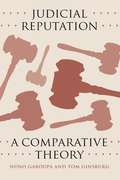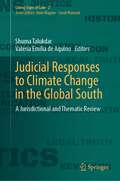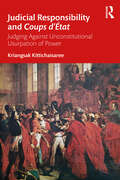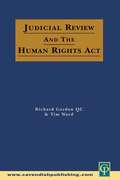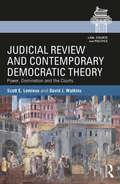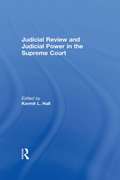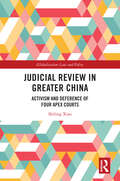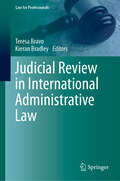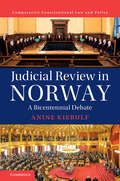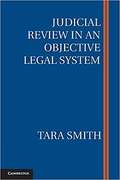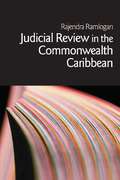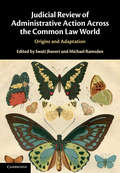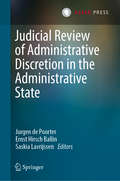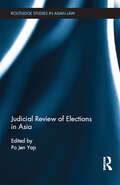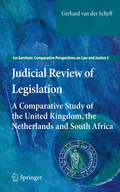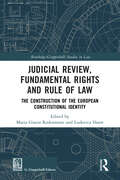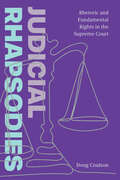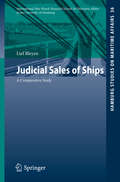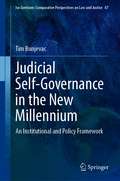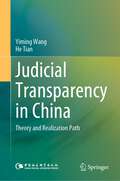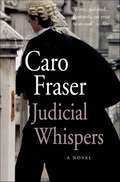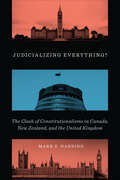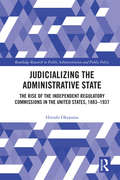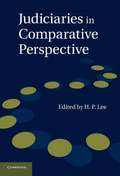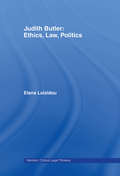- Table View
- List View
Judicial Reputation: A Comparative Theory
by Tom Ginsburg Nuno GaroupaJudges are society’s elders and experts, our masters and mediators. We depend on them to dispense justice with integrity, deliberation, and efficiency. Yet judges, as Alexander Hamilton famously noted, lack the power of the purse or the sword. They must rely almost entirely on their reputations to secure compliance with their decisions, obtain resources, and maintain their political influence. In Judicial Reputation, Nuno Garoupa and Tom Ginsburg explain how reputation is not only an essential quality of the judiciary as a whole, but also of individual judges. Perceptions of judicial systems around the world range from widespread admiration to utter contempt, and as judges participate within these institutions some earn respect, while others are scorned. Judicial Reputation explores how judges respond to the reputational incentives provided by the different audiences they interact with—lawyers, politicians, the media, and the public itself—and how institutional structures mediate these interactions. The judicial structure is best understood not through the lens of legal culture or tradition, but through the economics of information and reputation. Transcending those conventional lenses, Garoupa and Ginsburg employ their long-standing research on the latter to examine the fascinating effects that governmental interactions, multicourt systems, extrajudicial work, and the international rule-of-law movement have had on the reputations of judges in this era.
Judicial Responses to Climate Change in the Global South: A Jurisdictional and Thematic Review (Living Signs of Law #2)
by Shuma Talukdar Valéria Emília de AquinoThis book explores how judiciaries in different parts of the world are responding to climate change and how climate change intersects with the law. It offers feminist approaches to the judicial responses to climate change in the Global South, providing both jurisdictional and thematic reviews. Climate change is one of the most pressing global issues facing humankind, and is currently reshaping geopolitics, governance, law, and international relations around the world.The book’s originality lies in its endeavour to highlight judicial perspectives on climate change from prominent female researchers who have been working on this subject professionally and/or academically, bringing both regional and international views to the subject. The main objective is to give a new meaning to the study of climate change by bringing together the most recent aspects, including climate litigation, eco-constitutionalism and the environmental rule of law, climate and environmental justice, climate geopolitics and climate governance.The book will be of interest to students, academics, and scholars of climate law and environmental law around the world.
Judicial Responsibility and Coups d’État: Judging Against Unconstitutional Usurpation of Power
by Kriangsak KittichaisareeThis book examines the responsibility of judges of domestic courts following unconstitutional usurpation of power of government (coups d’état). It explores judges’ liability for failing to discharge their judicial duty independently and impartially, and the criminality of usurpers and their accomplices and collaborators for their violation of fundamental rights and freedoms or commission of crimes of international concern. Written by a highly regarded non-Western author, the book is coherent and meticulously researched, covering an approach to coups in an insightful and fascinating fashion. It includes a sophisticated and thorough analysis of the relevant comparative jurisprudence of domestic and international courts, with concrete examples of the best practices among decisions of domestic courts in countries that have experienced coups d’état. With an increasing global interest in the phenomenon of coups, democratic backsliding and the place and role of the judiciary as the only hope to rein in acts of unconstitutional usurpation of power, the book will be essential reading for members of the legal profession, those cherishing democracy as well as students and researchers in constitutional law, law and political science, public international law, international human rights law, international criminal law, regime changes, transitional justice and international organizations.
Judicial Review & the Human Rights Act
by Richard Gordon Tim WardThe Human Rights Act 1998 had a profound effect on the law of the United Kingdom,and in no area more so than judicial review. This book gives practical guidance on the interplay between the Act and domestic public law.
Judicial Review and Contemporary Democratic Theory: Power, Domination, and the Courts (Law, Courts and Politics)
by Scott E. Lemieux David J. WatkinsFor decades, the question of judicial review’s status in a democratic political system has been adjudicated through the framework of what Alexander Bickel labeled "the counter-majoritarian difficulty." That is, the idea that judicial review is particularly problematic for democracy because it opposes the will of the majority. Judicial Review and Contemporary Democratic Theory begins with an assessment of the empirical and theoretical flaws of this framework, and an account of the ways in which this framework has hindered meaningful investigation into judicial review’s value within a democratic political system. To replace the counter-majoritarian difficulty framework, Scott E. Lemieux and David J. Watkins draw on recent work in democratic theory emphasizing democracy’s opposition to domination and analyses of constitutional court cases in the United States, Canada, and elsewhere to examine judicial review in its institutional and political context. Developing democratic criteria for veto points in a democratic system and comparing them to each other against these criteria, Lemieux and Watkins yield fresh insights into judicial review’s democratic value. This book is essential reading for students of law and courts, judicial politics, legal theory and constitutional law.
Judicial Review and Judicial Power in the Supreme Court: The Supreme Court in American Society (The\supreme Court In American Society Ser. #Vol. 4)
by Kermit L. HallAvailable as a single volume or as part of the 10 volume set Supreme Court in American Society
Judicial Review in Greater China: Activism and Deference of Four Apex Courts (Globalization: Law and Policy)
by Shiling XiaoThis book examines the judicial review systems in the four areas of Greater China – China, Taiwan, Hong Kong, and Macau – and uncovers judicial review activities of the apex courts of each region. It provides a comparative assessment of judicial activism and deference. The development of modern judicial review is one of the key elements of the twentieth century’s legal heritage. By enforcing the principles of constitutionalism, the rule of law, and human rights protection, many courts have been vested with unprecedented powers and have played an essential role in supervising the exercise of government power through constitutional and administrative review. This work investigates the most up-to-date aspects of judicial review in Greater China and reflects on the modern theory regarding the judicialization of politics in different political regimes: democratic, authoritarian, and hybrid. The volume collects all substantive judicial review decisions delivered in the past twenty years by the four apex courts: the China’s Supreme People’s Court, the Taiwan Constitutional Court, the Court of Final Appeal of Hong Kong, and the Court of Final Appeal of Macau. This comprehensive dataset includes some 800 judicial review decisions, presenting a comprehensive resource of fundamental baseline data for evaluating judicial review in Greater China. The book will be an invaluable companion for scholars and researchers working in the areas of Comparative Public Law, Comparative Constitutional Law, Constitutional Politics, and Asian Studies.
Judicial Review in International Administrative Law (Law for Professionals)
by Kieran Bradley Teresa BravoThis book addresses the topic of judicial review in international administrative law, focusing in particular on the case law of the most established international administrative tribunals (e.g the United Nations Appeal and Dispute Tribunals, the Administrative Tribunal of the International Labor Organization, the one of the Inter-American Development Bank Group, the International Monetary Fund, the World Bank and the Organization of American States) as well as, the major challenges faced by these jurisdictions at the present time, when dealing with grievances of international civil servants. The book is composed of seven chapters, written by legal professionals (all of them with significant experience in international administrative law) and address different subjects, such as, “the doctrine of acquired rights”, the institutional setting of the administrative tribunal of the Inter-American Development Bank Group, legal standing and the role played by staff associations in the context of judicial review of administrative decisions. The purpose was to identify the main constraints staff associations face and discuss whether it is possible (and if so, how) for those associations to challenge decisions of an administrative and regulatory nature. The three final chapters of the book are inter-related and address the most difficult challenges in this jurisdiction, since they focus on investigations for misconduct, including harassment, and disciplinary procedures. The authors addressed the role and mandate of the investigators, the means at their disposal to pursue those functions, as well the different standards of proof applied by administrative tribunals to disputes in these areas.
Judicial Review in Norway: A Bicentennial Debate (Comparative Constitutional Law and Policy)
by Anine KierulfOutside the United States, Norway's 1814 constitution is the oldest still in force. Constitutional judicial review has been a part of Norwegian court decision-making for most of these 200 years. Since the 1990s, Norway has also exercised review under the European Convention of Human Rights. Judicial review of legislation can be controversial: having unelected judges overruling popularly elected majorities seems undemocratic. Yet Norway remains one of the most democratic countries in the world. How does Norway manage the balance between democracy and judicial oversight? Author Anine Kierulf tells the story of Norwegian constitutionalism from 1814 until today through the lens of judicial review debates and cases. This study adds important insights into the social and political justifications for an active judicial review component in a constitutional democracy. Anine Kierulf argues that the Norwegian model of judicial review provides a useful perspective on the dichotomy of American and European constitutionalism.
Judicial Review in an Objective Legal System
by Tara SmithHow should courts interpret the law? While all agree that courts must be objective, people differ sharply over what this demands in practice: fidelity to the text? To the will of the people? To certain moral ideals? In Judicial Review in an Objective Legal System, Tara Smith breaks through the false dichotomies inherent in dominant theories - various forms of originalism, living constitutionalism, and minimalism - to present a new approach to judicial review. She contends that we cannot assess judicial review in isolation from the larger enterprise of which it is a part. By providing careful clarification of both the function of the legal system as well as of objectivity itself, she produces a compelling, firmly grounded account of genuinely objective judicial review. Smith's innovative approach marks a welcome advance for anyone interested in legal objectivity and individual rights.
Judicial Review in the Commonwealth Caribbean (Commonwealth Caribbean Law Ser.)
by Rajendra RamloganThe establishment of the Caribbean Court of Justice sees the countries of the Commonwealth Caribbean at an important and exciting judicial crossroads. Debate, often acrimonious, continues over the abolishment of ties to the Judicial Committee of the Privy Council and, increasingly those influencing the debate are a more educated and articulate Cari
Judicial Review of Administrative Action Across the Common Law World: Origins and Adaptation
by Swati Jhaveri Michael RamsdenResearch on comparative administrative law, in contrast to comparative constitutional law, remains largely underdeveloped. This book plugs that gap. It considers how a wide range of common law systems have received and adapted English common law to the needs of their own socio-political context. Readers will be given complex insights into a wide range of common law systems of administrative law, which they may not otherwise have access to given how difficult it would be to research all of the systems covered in the volume single-handedly. The book covers Scotland, Ireland, the USA, Canada, Israel, South Africa, Kenya, Malaysia, Singapore, Hong Kong SAR, India, Bangladesh, Australia and New Zealand. Comparative public lawyers will have a much greater range of common law models of administrative law - either to pursue conversations about their own common law system or to sophisticate their comparison of their system (civil law or otherwise) with common law systems.
Judicial Review of Administrative Discretion in the Administrative State
by Saskia Lavrijssen Ernst Hirsch Ballin Jurgen De PoorterThis book deals with one of the greatest challenges for the judiciary in the 21st century. It reflects on the judiciary’s role in reviewing administrative discretion in the administrative state; a role that can no longer solely be understood from the traditional doctrine of the Trias Politica.Traditionally, courts review acts of administrative bodies implying a degree of discretion with quite some restraint. Typically it is reviewed whether the decision is non-arbitrary or whether there is no manifest error of assessment. The question arises though as to whether the concern regarding ensuring the non-arbitrary character of the exercise of administrative power, which is frequently performed at a distance from political bodies, goes far enough to guarantee that the administration exercises its powers in a legitimate way.This publication searches for new modes of judicial review of administrative discretion exercised in the administrative state. It links state-of-the-art academic research on the role of courts in the administrative state with the daily practice of the higher and lower administrative courts struggling with their position in the evolving administrative state.The book concludes that with the changing role and forms of the administrative state, administrative courts across the world and across sectors are in the process of reconsidering their roles and the appropriate models of judicial review. Learning from the experiences in different sectors and jurisdictions, it provides theoretical and empirical foundations for reflecting on the advantages and disadvantages of different models of review, the constitutional consequences and the main questions that deserve further research and debate.Jurgen de Poorter is professor of administrative law at Tilburg University and deputy judge in the District Court of The Hague.Ernst Hirsch Ballin is distinguished university professor at Tilburg University, professor in human rights law at the University of Amsterdam, and president of the T.M.C. Asser Institute for International and European Law. He is also a member of the Scientific Council for Government policy (WRR).Saskia Lavrijssen is professor of Economic Regulation and Market Governance of Network Industries at Tilburg University.
Judicial Review of Elections in Asia (Routledge Studies in Asian Law)
by Po Jen YapIn the past century, Asian nations have experienced a wave of democratisation as countries in the region have gained independence or transitioned from authoritarian military rule towards more participatory politics. At the same time, there has been an expansion of judicial power in Asia, whereby new courts or empowered old ones emerge as independent constraints on governmental authority. This is the first book to assess the judicial review of elections in Asia. It provides important insights into how Asian courts can strategically engage with the political actors in their jurisdictions and contribute to a country’s democratic discourse. Each chapter in the book sheds light on the judicial review of elections and the electoral process in a specific Asian jurisdiction, including Common Law Asia, namely Hong Kong, India, Malaysia, and Singapore, as well as jurisdictions in Civil Law Asia, namely Indonesia, Japan, the Republic of Korea, Taiwan, and Thailand. It fills a gap in the literature by addressing a central challenge to democratic governance, namely the problem of partisan self-dealing in the electoral processes. By exploring the constantly evolving role of the courts in addressing pivotal constitutional questions, this book will be of interest to students and scholars of Asian Law, Governance and Politics.
Judicial Review of Legislation
by Gerhard van der SchyffConstitutionalism is the permanent quest to control state power, of which the judicial review of legislation is a prime example. Although the judicial review of legislation is increasingly common in modern societies, it is not a finished project. This device still raises questions as to whether judicial review is justified, and how it may be structured. Yet, judicial review's justification and its scope are seldom addressed in the same study, thereby making for an inconvenient divorce of these two related avenues of study. To narrow the divide, the object of this work is quite straightforward. Namely, is the idea of judicial review defensible, and what influences its design and scope? This book addresses these matters by comparing the judicial review of legislation in the United Kingdom (the Human Rights Act of 1998), the Netherlands (the Halsema Proposal of 2002) and the Constitution of South Africa of 1996. These systems present valuable material to study the issues raised by judicial review. The Netherlands is of particular interest as its Constitution still prohibits the constitutional review of acts of parliament, while allowing treaty review of such acts. The Halsema Proposal wants to even out this difference by allowing the courts also to apply constitutional norms to legislation and not only to international norms. The Human Rights Act and the South African Constitution also present interesting questions that will make their study worthwhile. One can think of the issue of dialogue between the legislature and the judiciary. This topic enjoys increased attention in the United Kingdom but is somewhat underexplored in South African thought on judicial review. These and similar issues are studied in each of the three systems, to not only gain a better understanding of the systems as such, but also of judicial review in general.
Judicial Review, Fundamental Rights and Rule of Law: The Construction of the European Constitutional Identity (Routledge-Giappichelli Studies in Law)
by Maria Grazia Rodomonte Ludovica DurstThis book explores the complex issue of building a common European identity and the factors that contribute to it, with special regard to the role played by the interaction between national Constitutional Courts and European Courts. There is no doubt that the Courts have been key actors in the progressive establishment of this identity over the years by defining elements of homogeneity and affirming or reaffirming essential values, such as human dignity, in respect of that pluralism which represents a distinctive feature of Europe. Nevertheless, this ‘circular movement’ has not failed to reveal contradictions and concerns that are still unresolved over time. With contributions from authors from a range of backgrounds, this work delves into the theme with a variety of approaches and perspectives. It is structured in three main parts, the first exploring the historical roots of a common European heritage, emphasizing its role in shaping what is currently called the ‘European way of life’. The second part examines the ‘lights and shadows’ of constructing the European identity through the instruments of multilevel and inter-court relationships, by critically analysing the propulsive and homogenising tendencies coming in particular from the Court of Justice of the European Union. The third part considers the so-called ‘dialogue between Courts’, by addressing some significant jurisprudential trends of supranational and national Courts and relevant cases in recent years, offering new insights into the ‘model’ of multilevel protection of rights. Presenting a wide and comprehensive view of these topics, the book will be of interest to those working in the fields of Constitutional, European and Comparative Public Law, as well as Legal History and Sociology.
Judicial Rhapsodies: Rhetoric and Fundamental Rights in the Supreme Court
by Doug CoulsonAll judges legitimize their decisions in writing, but US Supreme Court justices depend on public acceptance to a unique degree. Previous studies of judicial opinions have explored rhetorical strategies that produce legitimacy, but none have examined the laudatory, even operatic, forms of writing Supreme Court justices have used to justify fundamental rights decisions. Doug Coulson demonstrates that such “judicial rhapsodies” are not an aberration but a central feature of judicial discourse. First examining the classical origins of divisions between law and rhetoric, Coulson tracks what he calls an epideictic register—highly affective forms of expression that utilize hyperbole, amplification, and vocabularies of praise—through a surprising number of landmark Supreme Court opinions. Judicial Rhapsodies recovers and revalues these instances as significant to establishing and maintaining shared perspectives that form the basis for common experience and cooperation. “Judicial Rhapsodies is both compelling and important. Coulson brings his well-developed knowledge of rhetoric to bear on one of the most central (and most democratically fraught) means of governance in the United States: the Supreme Court opinion. He demonstrates that the epideictic, far from being a dispensable or detestable element of judicial rhetoric, is an essential feature of how the Court operates and seeks to persuade.” —Keith Bybee, Syracuse University
Judicial Sales of Ships
by Lief BleyenThis work focuses on a specific aspect of the enforcement of maritime claims, namely judicial sales of ships, a procedure creditors typically resort to in the event of an irreversible default situation. A substantial part of the book approaches the topic from a comparative perspective, the goal being to assess the similarities and differences of the judicial sale procedure between three specific jurisdictions: Belgium, the Netherlands, and England & Wales. In this study, the comparison is used to further analyse the impacts of these differences on the effectiveness and reliability of the judicial sale procedure in each jurisdiction and also forms the basis for assessing the feasibility of harmonising judicial sale procedures and fostering their acceptance. Considering the international character typical of judicial sales of ships, conflict-of-law questions are very likely to arise during these procedures. Accordingly, the comparative study, where appropriate, is viewed against a private international law background.
Judicial Self-Governance in the New Millennium: An Institutional and Policy Framework (Ius Gentium: Comparative Perspectives on Law and Justice #87)
by Tim BunjevacThis book is a comparative study of judge-managed court systems across Australia, Europe and North America. This book makes an original contribution to the literature of court administration by providing a framework for examining court-service models of judicial councils, the policymaking bodies of courts and tribunals. This book promises to assist court administration scholars, judicial leaders, and policymakers in devising more effective organizational solutions to the contemporary challenges of judicial self-governance. The author Dr. Tim Bunjevac offers a nuanced elaboration of judicial accountability in court administration and a model institutional framework of court governance, comparing key Australian and international models of court administration, including the Australian Federal and two state court systems, Irish, English, Canadian and Dutch models. With a close case study, the author puts his sharpest focus on the Victoria, Australia, which introduced a judicial council in 2014. This book does an innovative job of proposing a new elaboration of judicial accountability in court administration. This book proposes that the likely success of any court system reform ultimately depends on the quality of the interaction between the courts, government, and other justice system stakeholders, which must be rooted in the concepts of organizational transparency and administrative accountability.
Judicial Transparency in China: Theory and Realization Path
by Yiming Wang He TianBased on the Judicial Transparency Index Assessment (2019 and 2020) conducted in China by the Institute of Law of the Chinese Academy of Social Sciences, this book summarizes and analyzes the current situation of judicial openness in China, using a sample of 218 courts across the country for the study. The book analyzes the ideological and institutional origins of judicial openness and examines the operation of judicial openness through the practical experience of role replacement. By analyzing evaluation data in the fields of audit information disclosure, trial information disclosure, judicial enforcement data disclosure, and judicial reform data disclosure, the book points out that the current judicial disclosure has made significant progress, but there are still problems such as unclear disclosure standards, insufficient rigidity in disclosure requirements, and the scope of disclosure still needs to be expanded. The book recommends accelerating the disclosure of judicial legislation, public standards, and strengthening assessment and accountability.
Judicial Whispers: A Novel (Caper Court Ser. #2)
by Caro Fraser“Fraser engages her readers quickly and never lets go” in this drama about a judge who tries to hide his sexual past by pursuing a suitable wife (Tatler Magazine).The whispers begin when Leo Davies, charming, clever barrister in one of London’s most prestigious chambers, applies to take silk. Despite a life of seemingly unflawed social and professional brilliance, Leo has made a mistake: he is suspected of having a lurid and peculiar sexual past. With too many skeletons in his closet, Leo decides that in order to achieve the coveted position of Queen’s Council, the rumors must be scotched. And as desperate times call for desperate measures, he resolves to find a suitable woman and preferably marry her.Thus begins a quest in which Leo, determined that his ambition will not be thwarted, sets out to woo and win the perfect, beautiful solicitor Rachael Dean. But Leo has taken on more than he bargained for: Rachael not only has a dazzling career in front of her, but also a dark and frightening past.Leo’s tangled, sophisticated life, Rachael’s newly awakened passions, and the unrequited love of a bright young barrister, Anthony Cross, form the intricate cat’s cradle at the heart of this absorbing novel. Judicial Whispers is a tale of relationships, deceit and ambition in which Caro Fraser brings to life with uncanny accuracy the obsessions and delusions of people in love.“Witty, polished . . . Rumpole, eat your heart out.” —She Magazine
Judicializing Everything?: The Clash of Constitutionalisms in Canada, New Zealand, and the United Kingdom
by Mark S. HardingNearly every common law jurisdiction in the world has adopted a charter or bill of rights. Yet adopting a new rights document creates, rather than resolves, many fundamental constitutional questions. Should constitutional rights be relevant in private disputes? Does every political question need a constitutional or judicial answer? Should courts and legislatures equally participate in addressing the scope of which issues are to be considered constitutional? Judicializing Everything? illustrates how debates surrounding these persistent judicial questions are best understood as part of an ongoing clash between distinct forms of constitutionalism on and off the bench. Mark S. Harding canvasses the perennial debates within the field of constitutional studies and provides novel ways of understanding key disagreements between judges and scholars alike. Despite important formal differences between rights documents in Canada, New Zealand, and the United Kingdom, Judicializing Everything? shows that there are also considerable similarities in the kinds of cases, arguments, and legal outcomes in the three countries. As political life becomes increasingly constitutionalized and judicialized, this important book sheds light on the persistence of debates over bills of rights and their interpretation.
Judicializing the Administrative State: The Rise of the Independent Regulatory Commissions in the United States, 1883-1937 (Routledge Research in Public Administration and Public Policy)
by Hiroshi OkayamaA basic feature of the modern US administrative state taken for granted by legal scholars but neglected by political scientists and historians is its strong judiciality. Formal, or court-like, adjudication was the primary method of first-order agency policy making during the first half of the twentieth century. Even today, most US administrative agencies hire administrative law judges and other adjudicators conducting hearings using formal procedures autonomously from the agency head. No other industrialized democracy has even come close to experiencing the systematic state judicialization that took place in the United States. Why did the American administrative state become highly judicialized, rather than developing a more efficiency-oriented Weberian bureaucracy? Legal scholars argue that lawyers as a profession imposed the judicial procedures they were the most familiar with on agencies. But this explanation fails to show why the judicialization took place only in the United States at the time it did. Okayama demonstrates that the American institutional combination of common law and the presidential system favored policy implementation through formal procedures by autonomous agencies and that it induced the creation and development of independent regulatory commissions explicitly modeled after courts from the late nineteenth century. These commissions judicialized the state not only through their proliferation but also through the diffusion of their formal procedures to executive agencies over the next half century, which led to a highly fairness-oriented administrative state.
Judiciaries in Comparative Perspective
by H. P. LeeAn independent and impartial judiciary is fundamental to the existence and operation of a liberal democracy. Focussing on Australia, Canada, New Zealand, South Africa, the United Kingdom and the United States, this comparative study explores four major issues affecting the judicial institution. These issues relate to the appointment and discipline of judges; judges and freedom of speech; the performance of non-judicial functions by judges; and judicial bias and recusal, and each is set within the context of the importance of maintaining public confidence in the judiciary. The essays highlight important episodes or controversies affecting members of the judiciary to illustrate relevant principles.
Judith Butler: Ethics, Law, Politics (Nomikoi: Critical Legal Thinkers)
by Elena LoizidouThe first to use Judith Butler’s work as a reading of how the legal subject is formed, this book traces how Butler comes to the themes of ethics, law and politics analyzing their interrelation and explaining how they relate to Butler’s question of how people can have more liveable and viable lives. Acknowledging the potency and influence of Butler’s ‘concept’ of gender as process, which occupies a well developed and well discussed position in current literature, Elena Loizidou argues that the possibility of people having more liveable and viable lives is articulated by Butler within the parameters of a sustained agonistic relationship between the three spheres of ethics, law and politics. Suggesting that Butler’s rounded understanding of the interrelationship of these three spheres will enable critical legal scholarship, as well as critical theory more generally, to consider how the question of life’s unsustainable conditions can be rethought and redressed, this book is a key read for all students of legal ethics, political philosophy and social theory.
